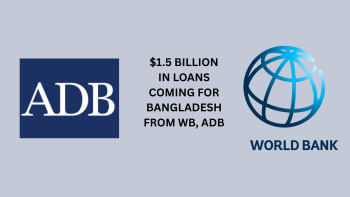Bangladesh’s banking sector reforms: ADB to provide $1b in budget support

- $500m to be disbursed this fiscal year, the rest in next fiscal year
- 25 conditions including creation of a stability fund to recapitalise distressed banks
- Central bank will formulate detailed strategies utilising these funds
The Asian Development Bank plans to provide $1 billion in budget support to advance Bangladesh's banking sector reforms, contingent on 25 conditions including the creation of a financial stability fund for banks facing capital shortfalls.
The funds will be released in two phases -- $500 million in the current fiscal year and the remaining $500 million in the next, according to a recent ADB report.
This follows last month's approval of a separate $500 million allocation, granted after the government and the Bangladesh Bank undertook initial reform measures.
The reforms were launched in response to the deteriorating financial health of several banks weakened by irregularities and scams during the Awami League government's tenure.
Among the conditions for the $1 billion package, the ADB has asked the central bank to complete asset quality reviews (AQRs) of stressed banks to identify impaired assets and ensure regulatory and provisioning compliance.
The central bank will also submit the Ordinance for the Bankruptcy (Amendment) Act, 2024, for approval to strengthen the insolvency process.
It will finalise the framework of a financial stability fund for emergency recapitalisation of banks that breach capital adequacy requirements. The BB will ensure its implementation, while the finance ministry will provide the agreed initial corpus to operationalise the stability fund.
"Bangladesh Bank is currently assessing the required amount to create the stability fund," said an official with knowledge of the matter.
According to finance ministry officials, the government has already earmarked an allocation for the stability fund in the current fiscal year's budget.
The ADB, alongside the International Monetary Fund and the World Bank, is supporting Bangladesh's banking sector reforms. Among them, the ADB is one of the lead development partners helping advance critical changes to strengthen the country's financial sector.
"Key reforms supported by ADB include the completion of comprehensive asset quality reviews (AQRs) of key banks," the ADB report said, noting the reviews were funded through its technical assistance.
As of May, AQRs for six systemically important banks had been completed. The reviews applied standardised templates and methodologies to ensure consistency across institutions.
"ADB's work in completing AQRs will serve as a diagnostic foundation for correctly sequenced, evidence-based reforms on recapitalisation, resolution planning, and broader financial stability reforms leading to improved governance, increased market confidence and a more resilient banking sector in the next five years," the report added.
In a major consolidation effort, the BB has initiated the merger of five Islamic banks into a single entity following AQRs conducted by global audit firms. Reviews are also underway for 11 other stressed banks.
The legislative measures under the ADB's loan programme include submitting the Ordinance for the Negotiable Instruments (Amendment) Act, 2024, to strengthen legal recourse against dishonoured cheques and failed loan recoveries. The BB will also propose the Ordinance for the Money Loan Court (Amendment) Act, 2003 to improve loan recovery processes.
Additionally, the BB will issue an executive order to establish asset management companies responsible for managing and recovering troubled loan assets. The government is expected to operationalise these companies as part of efforts to resolve non-performing assets.
The ADB anticipates that these reforms will lead to a more stable banking sector, improving access to finance -- especially for small and medium-sized enterprises (SMEs).
"An improved and stable banking system with strong governance and gradual adherence to international norms will be able to channel funds to the desired segments of the economy, including SMEs," the report said.
"A stronger banking system will be conducive to enable higher access to finance to the private sector of the country," it added.


 For all latest news, follow The Daily Star's Google News channel.
For all latest news, follow The Daily Star's Google News channel. 








Comments